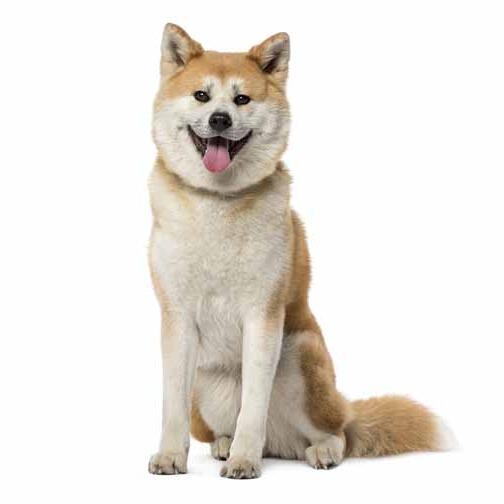
| Family-friendly: | 5/5 |
| Exercise needs: | 4/5 |
| Easy to train: | 2/5 |
| Tolerates being alone: | 1/5 |
| Likes other pets: | 1/5 |
| Energy level: | 4/5 |
| Grooming needs: | 4/5 |
| Shedding: | 5/5 |
The Japanese Akita breed can suffer from:
- Hip dysplasia
- Gastric dilatation volvulus
- Amelogenesis imperfecta/familial enamel hypoplasia which is an inherited disorder where the tooth enamel does not develop properly.
- Entropion¹ which is a painful eye condition where the eyelids roll inwards.
- Sebaceous adenitis² which is a disease affecting the skin glands and causing dry skin and hair loss.
Priority Kennel Club health schemes and testing:
None but there are several recommended schemes that the Kennel Club recommends which can be found here.
¹K. C. Barnett, 'Inherited eye disease in the dog and cat', 1988, Journal of Small Animal Practice
²L. Cacini, 'Serum 25-hydroxyvitamin D concentration in Japanese Akita dogs: A survey', Dec 2020 Veterinary and Animal Science
Not unexpectedly, Akita are strong dogs – in body and character – and are not recommended for the novice owner. They need experienced handling and early and ongoing socialisation and training. They are, however, very loyal to their own family, while aloof and reserved - and generally suspicious - of strangers. Courageous, they make good but often silent watchdogs - a trait that was much admired in their homeland. Their hunting and protective instincts are strong and this must be remembered at all times.
| Family-friendly: | 5/5 |
| Exercise needs: | 4/5 |
| Easy to train: | 2/5 |
| Tolerates being alone: | 1/5 |
| Likes other pets: | 1/5 |
| Energy level: | 4/5 |
| Grooming needs: | 4/5 |
| Shedding: | 5/5 |
The Akita, the largest of all the Japanese breeds, was originally bred in the province of Akita in the 1600 and was originally developed as a highly successful fighting dog. In the late 19th century however, other breeds were imported into the fighting scene making the Japanese breeds suffer in popularity. As dog fighting fell out of favour, the Akita needed to find other jobs to do in order to survive, and managed this effortlessly by multi-tasking as a hunting dog, a guard dog, a police dog, a show dog and a much-loved companion.
The Akita owner should understand their breed has a reputation of being hard to read, and be prepared to both socialise thoroughly and correctly, and manage their dog sensibly to avoid mistakes. They are devoted but often aloof so this isn’t usually a cuddly dog. Ideal owners are either child free or have older children who also understand their dog won’t love everyone and that adverse reactions can seem to come from nowhere if they don’t know this breed (and their own dog) well. Beyond that, a love of vacuuming up dog hair, long walks and dog training are vital!
As with many breeds, the Japanese Akita can suffer from hereditary eye disorders and hip dysplasia (a condition that can lead to mobility problems). Eye testing and hip scoring of dogs prior to breeding is therefore important.
Akitas will enjoy as much dog exercise as you want to give them but need one to two hours every day.
This is a large dog who needs space and who enjoys having a large secure garden to wander around in and patrol. With their aloofness towards strangers, the Akita does best without close neighbours and constant disruptions and so a more rural home is perfect.
Large breed dogs, as well as having large appetites, benefit from a balanced diet with many different nutrients including minerals and vitamins compared to smaller-breed dogs. The Japanese Akita is prone to bloating and stomach problems; smaller, more frequent meals can help minimise this risk.
When it comes to dog grooming, Akitas come with a coat that should be kept well-groomed two or three times a week to bring out the best in it, and, twice a year, during heavy moults, a metal, double-toothed comb should be used. They do tend to shed a lot!
As with most big, powerful working dogs, Akitas need a lot of dog training and ongoing socialisation to ensure they are under control and safe around other dogs and people. They have a strong hunting instinct so while a good recall is extremely important to train, it shouldn’t always be relied upon and management is equally as important. While some Akitas enjoy training, many are far less interested in traditional obedience although they are strongly bonded to their owners and rarely wander far from them.
The Japanese Akita doesn’t make a great family dog - as while devoted to their own family, they do not enjoy visitors and the disruptions that come with family life. They can however make good companions in a quiet house with older sensible children.
All dogs and children need to be taught to get on with each other and be safe together. Even so, dogs and children should never be left alone together and adults should supervise all interactions between them.
The most famous Japanese Akita was Hachi, the loyal companion of a Tokyo professor Eizaburo Ueno. Each day Hachi would accompany his master to the train station and would also be waiting for him when he got back from work. On 25th May 1925, Professor Ueno died in his office but for the next nine years and until his own death, Hachi made the lonely journey back and forward to the station waiting for his master who never came. There is a statue at the station in his memory.